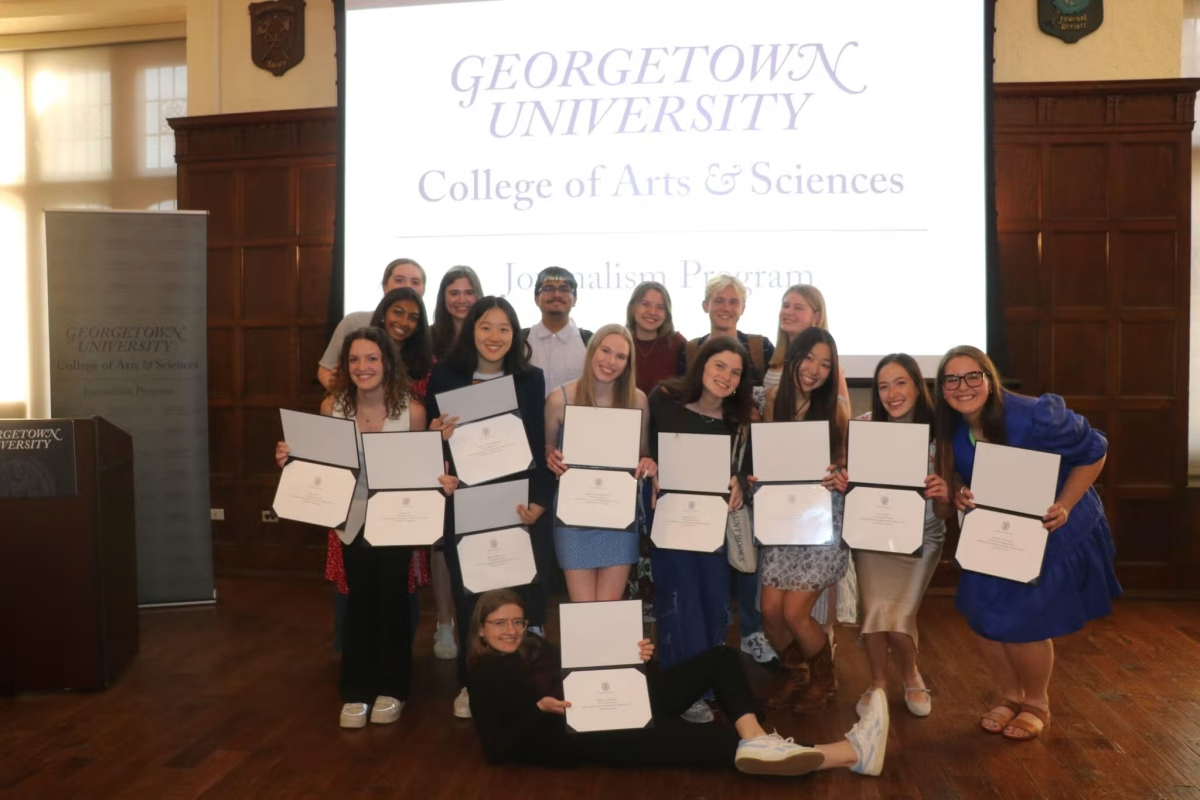Editor’s Note: This letter from the editors is a concurring opinion with The Georgetown Voice. You can read their article here.
The Georgetown Voice today published an editorial titled “Georgetown must protect our community from the threat of Trump’s second term,” calling on the university to implement proactive policies to protect students who may be made vulnerable once President-elect Donald Trump takes office Jan. 20, 2025. The piece is thought-provoking, and we encourage you to read it.
We write not to repeat The Voice’s arguments, but rather to draw attention to a deeper truth their piece reveals: Too many of us, regardless of our political affiliation or who we cast our ballots for, are not informed enough about the ways changes in political leadership and policy during the second Trump presidency might affect our school.
Many of you may have heard about Project 2025, the 900-page policy proposal written by the right-wing Heritage Foundation to provide a blueprint for another Trump presidency. Although Trump has repeatedly disavowed Project 2025, some of his top advisers from his first term were heavily involved in its creation. Since the Nov. 5 election, he has also appointed many of the proposal’s authors to positions in his new cabinet, including his picks of John Ratcliffe for director of central intelligence, Tom Homan for “border czar” and Brendan Carr for chair of the Federal Communications Commission.
If the Trump administration were to successfully implement some of the policies in Project 2025, much of Georgetown University would change.
The international feel of Georgetown’s campus would likely diminish: Project 2025 proposes a more limited Student and Exchange Visitor Program, the federal government’s program tracking and guiding international students at U.S. schools throughout the visa process — specifically, it aims to “eliminate or significantly reduce the number of visas issued to foreign students from enemy nations.”
However, the proposal does not make entirely clear which countries qualify as enemy nations. The university currently reports that over 3,500 individuals from 134 countries study, research and teach at Georgetown. Of these 134 countries, the U.S. Department of State designates eight — China, Myanmar, Iran, Nicaragua, Pakistan, Russia, Saudi Arabia and Tajikistan — as countries of particular concern (CPCs), or nations judged to be engaged in severe violations of religious freedom. An additional three countries represented in the Georgetown community — Algeria, Azerbaijan and Vietnam — are designated as special watch list countries, which are deemed to engage in or tolerate violations of religious freedom but do not meet all of the CPC criteria.
Adding further uncertainty, Project 2025 calls for the elimination of the U.S. Department of Education, meaning processes such as Title IX and federal student aid would be largely overhauled. For financial aid, Project 2025 proposes creating a new government corporation to manage student loans. Students who are neither U.S. citizens nor lawful permanent residents would be ineligible for federal student aid — and students at schools which provide in-state tuition to all state residents regardless of citizenship status would lose their loan access entirely.
Title IX, the federal law which prohibits discrimination “on the basis of sex” in educational institutions, would also face significant changes. Under President Joe Biden’s administration, the U.S. Department of Justice, which oversees Title IX enforcements, interprets Title IX as prohibiting discrimination based on sexual orientation, gender identity and intersex traits — a position which Georgetown’s policies align with. Project 2025’s plans include redefining “sex” to only include protections for discrimination based on biological sex at birth.
No matter how you feel about these policy proposals, if implemented, they will significantly alter the way Georgetown operates.
As students, it is our responsibility to stay informed about the way the federal government’s policy plans affect our university — particularly as Georgetown begins a leadership search for its next president after President John J. DeGioia (CAS’ 79, GRD ’95) stepped down. Student journalists across this university’s campus take seriously the responsibility and opportunity to report on Georgetown and Washington, D.C. — we hope, in particular, that you continue to grant us and other campus media outlets your readership and support as we cover these and other issues.
We urge you to take advantage, too, of the Hilltop’s opportunities to not just stay aware of but to participate in political discussion. Georgetown is lucky to have a student body which values politics, be that through courses, political clubs, debate societies, campus media or community service organizations. As we enter a period of political change, use the people and organizations around you to truly engage with the changes that may come Georgetown’s way.








